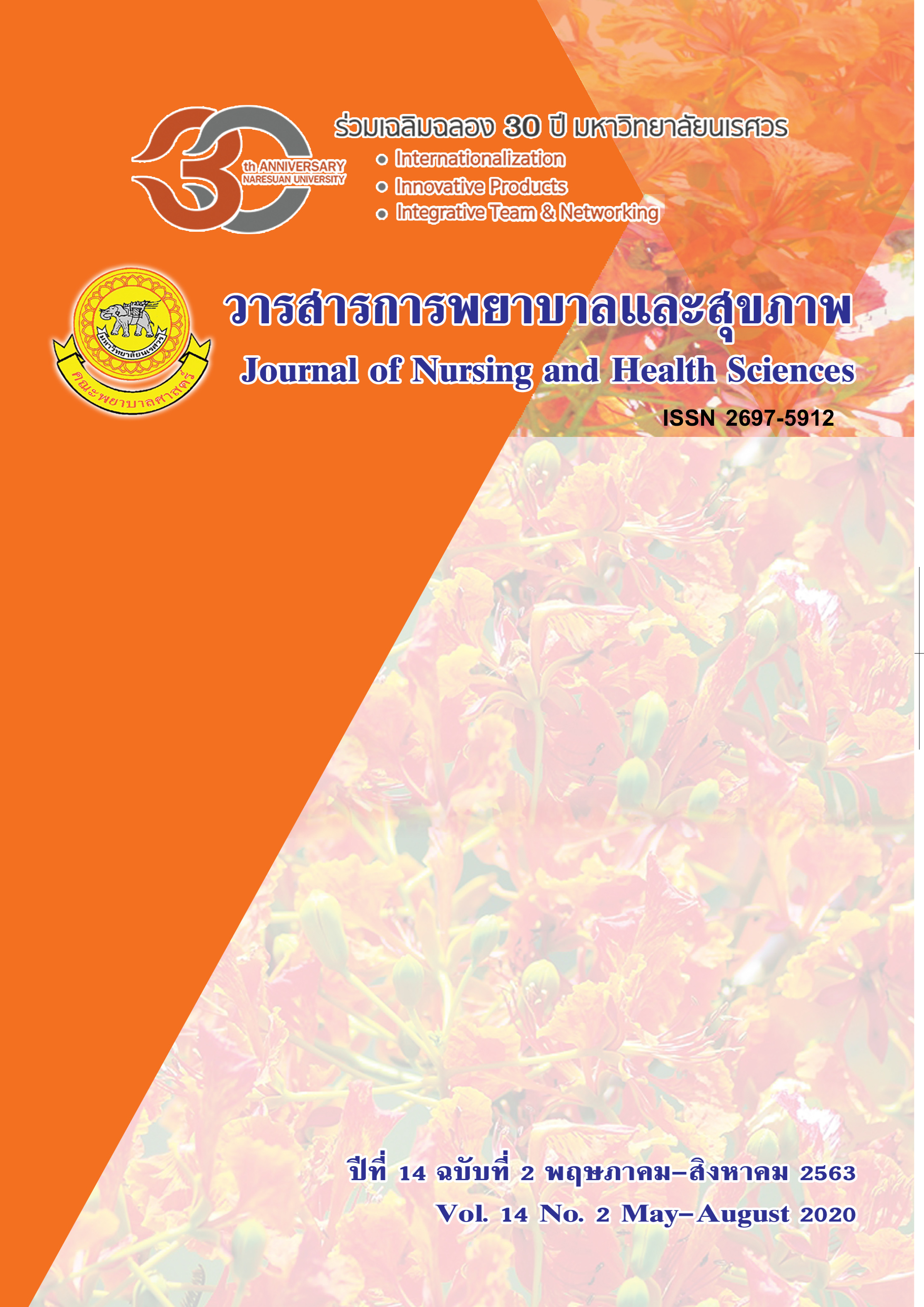Association between Diabetes Knowledge with Diabetes Self-management in Patients with Type 2 Diabetes Mellitus
Main Article Content
Abstract
Studies on the relationship between diabetes knowledge and diabetes self-management in Thailand are limited.The present study investigates the association between diabetes knowledge withdiabetes self-management. This study was employed a cross-sectional analytical study from 544 patients with type 2 diabetes mellitus, Phetchabunprovince. Participants were selected by using stratified two-stage cluster sampling from 3public hospitals who were follow-up in year 2019. Data were collected by a questionnaire with a self-administered. The questionnaire contains with diabetes knowledge and diabetes self-management. The content validity index of diabetes knowledge and diabetes self-management in each item werenot less than .6. The difficulty of diabetes knowledge in each item was in rang .4-.6. The Cronbach's alpha coefficients of diabetes self-management was .78. Data were analyzed using percentage, mean, standard deviation and multiple linear regression.The result shown that the diabetes knowledge(Adjusted mean difference = 6.38, 95% CI = 2.03 to 10.74; p-value = .016) was a strongly associated with diabetes self-management. Moreover, bachelor and higher education level (Adjusted mean difference = -10.93, 95% CI = -16.03 to -5.83; p-value < .001), duration of diabetes 10 years and higher (Adjusted mean difference = 6.24, 95% CI = 3.01 to 9.46; p-value = . 002), and received health education by talking face to face in the community (Adjusted mean difference = 5.97, 95% CI = 3.33to 8.62; p-value < .001) were also strongly associated with diabetes selfmanagement. This study demonstrates that the diabetes knowledge is associated with the diabetes self-management. Therefore, healthcare personnel should beprovidediabetes education intervention for patients who had low levels of diabetes knowledgeto improve diabetes self-management for those with low levels.
Article Details
References
Aekplakorn, W., Chariyalertsak, S., Kessomboon, P., Assanangkornchai, S., Taneepanichskul, S., & Putwatana, P. (2018). Prevalence of diabetes and relationship with socioeconomic status in the Thai population: National health examination survey, 2004–2014. Journal of Diabetes Research. Retrieved 22 May 2020 from http://downloads.hindawi.com/journals/jdr/2018/1654530.pdf.
Al-Khaledi, M., Al-Dousari, H., Al-Dhufairi, S., Al-Mousawi, T., Al-Azemi, R., Al-Azimi, F., & Badr, H. E. (2018). Diabetes self-management: A key to better health-related quality of life in patients with diabetes. Medical Principles and Practice: International Journal of the Kuwait University, Health Science Centre, 27(4), 323–331. https://doi.org/10.1159/000489310.
Bommer, C., Sagalova, V., Heesemann, E., Manne-Goehler, J., Atun, R., Bärnighausen, T., …& Vollmer, S. (2018). Global economic burden of diabetes in adults: Projections from 2015 to 2030. Diabetes Care, 41(5), 963–970. https://doi.org/10.2337/dc17-1962.
Dao-Tran, T. H., Anderson, D., Chang, A., Seib, C., & Hurst, C. (2018). Factors associated with self-management among Vietnamese adults with type 2 diabetes. Nursing open, 5(4), 507–516. https://doi.org/10.1002/nop2.158.
Gagliardino, J. J., Chantelot, J. M., Domenger, C., Ramachandran, A., Kaddaha, G., Mbanya, J. C., … & IDMPS Steering Committee (2019). Impact of diabetes education and self-management on the quality of care for people with type 1 diabetes mellitus in the Middle East (the International Diabetes Mellitus Practices Study, IDMPS). Diabetes research and clinical practice, 147, 29–36. https://doi.org/10.1016/j.diabres.2018.09.008.
Gurmu, Y., Gela, D. & Aga, F. (2018). Factors associated with self-care practice among adult diabetes patients in West Shoa Zone, Oromia Regional State, Ethiopia. BMC Health Service Research 18, 732. https://doi.org/10.1186/s12913-018-3448-4.
Harding, J. L., Pavkov, M. E., Magliano, D. J., Shaw, J. E., & Gregg, E. W. (2019). Global trends in diabetes complications: a review of current evidence. Diabetologia, 62(1), 3–16. https://doi.org/10.1007/s00125-018-4711-2.
Health Education Division, Ministry of Public Health, & Mahidol University. (2015). Development tools for health literacy in diabetes and hypertension. Retrieved 5 March 2016 from http://www.hed.go.th/news/5523. [in Thai].
King, H., Aubert, R. E., & Herman, W. H. (1998). Global burden of diabetes, 1995–2025: prevalence, numerical estimates, and projections. Diabetes Care, 21(9), 1414–1431.
Kugbey, N., Oppong Asante, K., & Adulai, K. (2017). Illness perception, diabetes knowledge and self-care practices among type-2 diabetes patients: a cross-sectional study. BMC research notes, 10(1), 381. https://doi.org/10.1186/s13104-017-2707-5.
Marathe, P. H., Gao, H. X., & Close, K. L. (2017). American diabetes association standards of medical care in diabetes 2017. Journal of Diabetes, 9(4), 320–324. https://doi.org/10.1111/1753-0407.12524.
Mickey, R. M., & Greenland, S. (1989). The impact of confounder selection criteria on effect estimation. American journal of epidemiology, 129(1), 125–137. https://doi.org/10.1093/oxfordjournals.aje.a115101.
Mostafa, S. A., Coleman, R. L., Agbaje, O. F., Gray, A. M., Holman, R. R., & Bethel, M. A. (2018). Modelling incremental benefits on complications rates when targeting lower HbA1c levels in people with type 2 diabetes and cardiovascular disease. Diabetic Medicine: A Journal of the British Diabetic Association, 35(1), 72–77. https://doi.org/10.1111/dme.13533.
Tachanivate, P., Phraewphiphat, R., Tanasanitkul, H., Jinnawaso, R., Areevut, C., Rattanasila, R., ... & Chanchat, S. (2019). Effectiveness of diabetes self - management education in Thais with type 2 diabetes. Pacific Rim International Journal of Nursing Research, 23(1), 74-86.
Saeedi, P., Petersohn, I., Salpea, P., Malanda, B., Karuranga, S., Unwin, N., … & IDF Diabetes Atlas Committee (2019). Global and regional diabetes prevalence estimates for 2019 and projections for 2030 and 2045: Results from the International Diabetes Federation Diabetes Atlas, 9th edition. Diabetes Research and Clinical Practice, 157, 107843. https://doi.org/10.1016/j.diabres.2019.107843
Salganik, M. J. (2006). Variance estimation, design effects, and sample size calculations for respondent-driven sampling. Journal of Urban Health: Bulletin of the New York Academy of Medicine, 83(6 Suppl), i98–i112. https://doi.org/10.1007/s11524-006-9106-x
Sangruangake, M., Jirapornkul, C., & Hurst, C. (2017). Psychometric properties of diabetes management self-efficacy in Thai type 2 diabetes mellitus patients: A multicenter study. International Journal of Endocrinology. Retrieved 26 September 2018 from https://www.hindawi.com/journals/ije/2017/2503156/.
Shrivastava, S. R., Shrivastava, P. S., & Ramasamy, J. (2013). Role of self-care in management of diabetes mellitus. Journal of Diabetes and Metabolic Disorders, 12(1), 14. https://doi.org/10.1186/2251-6581-12-14
Sonthon, P., Promthet, S., Changsirikulchai, S., Rangsin, R., Thinkhamrop, B., Rattanamongkolgul, S., & Hurst, C. P. (2017). The impact of the quality of care and other factors on progression of chronic kidney disease in Thai patients with Type 2 Diabetes Mellitus: A nationwide cohort study. PLoS ONE, 12(7), e0180977. https://doi.org/10.1371/journal.pone.0180977


